There are moments, big and small, throughout the history of cinema that make up our collective pop culture. While some are recognizable even to the most casual filmgoer, this column will be focusing on the lesser discussed moments, moments that you might not have considered before. Without them, the film wouldn’t be the same, even if you haven’t noticed it until now, and they matter just as much.
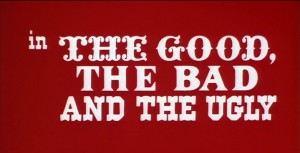
The Movie: The Good, The Bad, and the Ugly
The Gist: Three men try to outwit one another to be the first to find $200,000 in stolen U.S. gold while the Civil War rages around them. As the title might have led you to guess, one of them is Good, one of them is Bad, and yet another is The Ugly. Much manly posturing and unforgettable gunfights ensue.
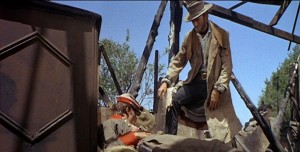
The Moment: After clearing what might be the final obstacle standing in the way of the treasure (a bridge being fought over by both sides), Blondie and Tuco (The Good and The Ugly, respectively) happen upon a shelled-out chapel. While Tuco keeps true to his nature and immediately steals a horse in an attempt to separate from Blondie and keep the treasure for himself, the golden haired discovers a young Rebel officer in his death throes. Rather than taking off after Tuco, he instead takes a moment, almost as an aside, and gives the dying man his coat to warm him, and the last few puffs of his cigarette to comfort him. Having recieved a final moment of kindness and relief, the soldier dies, and Blondie continues his foiling of Tuco.
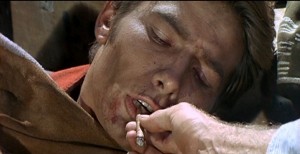
Why It Matters: It’s long been a postulation that Clint Eastwood’s Blondie is only really considered “The Good” when compared to the unrelenting cruelty of Angel Eyes (The Bad, obviously), and the bastard shiprat survivalist mentality of Tuco. Sure, he’s no saint: his introduction involves him gunning down three bounty hunters in order to use Tuco for a money making scheme. Then when he’s done with Tuco, he leaves him in the middle of the desert, his hands tied and without water. I’d argue, however, that being left in the desert is largely due to Tuco’s loud mouthed insults and inflated ego; Blondie is the one character in the film who keeps a level head about his importance, but also acts as sort of avenging angel when Tuco overestimates his own. Besides, as Blondie remarks when he leaves Tuco in the desert: “Such ingratitude after all the times I’ve saved your life.” Sure, Blondie’s saying,your situation sucks, but you’d have been a greasespot a long time ago without me. Let’s keep things in perspective.
This is, again, really only a measurable amount of “good” when viewed in comparison to Tuco. There’s not much to be drawn against Angel Eyes, since he exists primarily to be a foil to our two main characters, with equal amounts of intelligence and sadism that he proves to be a threat to both. Besides, his interactions with Blondie are minimal in the film; Angel Eyes coordinates around Blondie and mainly deals with the much more corruptible Tuco. Blondie kills when he has to, plays both sides passively, as if he finds their dealings largely amusing, a cosmic joke only he knows the punchline to; he shows little compassion or sympathy to anybody in particular, even though he keeps saving the life of this bastard known as Tuco.
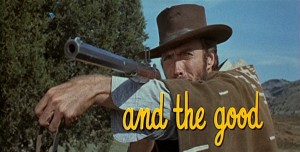
So what makes him so good? It can’t be a mistake that Leone, out of all his western characters, anointed the character of Blondie with the title “The Good”; he showed no need to have such a trait in his protagonists before, or since. Manco in For A Few Dollars More is all about the money and his own hide, and could in fact learn a thing or two from his companion Mortimer. In Once Upon a Time in the West, Harmonica’s entire existence is revenge, hardly a good quality, even if it is justifiable. And then there’s Duck You Sucker‘s John Mallory, who is probably the most sympathetic character in Leone’s western output, but has a tendency to be a downright Irish bastard rather than allow that sympathy be known. No, Blondie is “The Good,” even if you might not really see how in any distinguishable light at first.
But why start now, if he was content on painting his landscapes with characters morally ambiguous motivations and doing a damn good job at it to boot? Beyond meeting the requirements of the title (and really, such a great title could be enough motivation to make sure there was a character to fill the role), Leone was too smart a filmmaker with too much on his mind to let such acts of kindness exist without a purpose. The big picture here has more to do with the three main characters representing the aspects of humanity, for better or worse. With the case for humanity stacked two deep with unredeeming qualities–Angel Eyes’ ironic nickname combined with his selfish but oddly committed work ethic, Tuco with his similarly selfish and backstabbing nature, who wouldn’t have any ethics even if he knew the meaning of the word, needs to be counter balanced with something, something more than just a good looking gunslinger who always has just the right quip for the moment. For Blondie’s id to be able to push back against the other two thirds of this equation, Leone needed to make himself his first true Good Guy character. Of course, Leone being who he was, he made him a Good Guy on his own terms, which meant no removing of teeth from the character’s bite.
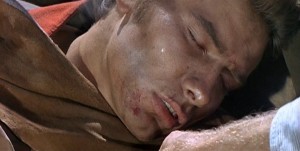
Most of Blondie’s quality demonstrated in this scene with the soldier: he could have left the soldier to keep Tuco on his leash, or mercifully ended the soldier’s pain with a well placed bullet to the head. But in the western world of Sergio Leone, being mercy killed like a lame cow is not the way for a man to die. It’s telling that the soldier is not crying, or whimpering for his mother when Blonde finds him: he’s waiting for death to find him, knows it’s coming, and probably welcomes it. Blondie sees the passing is imminent, and though he is under no advantage to do so, gives up his coat and his smoke to the kid. For Blondie, there’s no brownie points to be won; it’s just that he possess enough basic humanity to know that it’s quite simply the right thing to do. The kid’s on his way out, might as well let him go out in comfort. Having the common decency to do the right thing in this world is all it takes to be considered good, and since Blondie is the only one in the film to act upon it, the mantle is there, his for the taking.* Here, in this moment, Blondie truly becomes “The Good.”
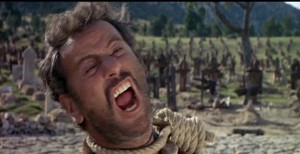
Even if he is still just a dirty son of a bAAAAAH-EEE-AAAAH-EEE-AAAAAH!
*Besides, no good deed goes unrewarded. Hey, look, here’s this really awesome poncho just layin’ here…